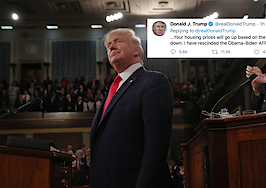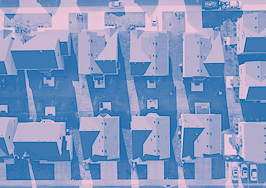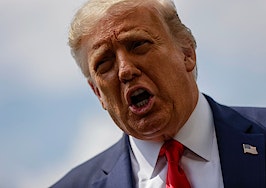President Donald Trump issued a host of economic measures Saturday by executive order, including one aimed at “fighting the spread of COVID-19 by providing assistance to renters and homeowners.”
While the order contains a number of mitigation measures that could lessen the impact COVID-19 would have on struggling renters, it falls short of extending the eviction moratorium included in the CARES Act, or offering a concrete rental assistance programn. The lack of a rental assistance program drew criticism from the National Association of Realtors (NAR).
“While NAR appreciates and is supportive of White House efforts to ensure struggling Americans can remain in their homes, we are disappointed in the administration’s decision to not tie an eviction moratorium with rental assistance — as they must be,” NAR President Vince Malta said in a statement. “We now strongly urge the administration and Congress to a come to swift, bipartisan resolution that protects both renters and housing providers.”
Among other housing protections, the 880-page CARES Act included a full eviction foreclosure. For the 120 days following the passage of the bill in March, the owners of any dwelling that participates in any housing program covered by various acts — including the low-income housing tax credit program, National Housing Act, Homeless Assistance Act, National Affordable Housing Act, rural housing voucher program and others — were prevented from beginning any action to initiate eviction proceedings to re-take possession of a dwelling for nonpayment of rent, or charge any fees or penalties related to nonpayment of rent.
Furthermore, any multi-family homeowners requesting forbearance on a mortgage securitized by Fannie Mae or Freddie Mac, could not evict or initiative eviction of tenants based on nonpayment of rent or charge any late fees to tenants due to late payment of rent.
Absent an agreement from Congress, the moratoriums expired on July 24.
“The CARES Act imposed a temporary moratorium on evictions of certain renters subject to certain conditions,” the Trump administration said in a statement. “That moratorium has now expired, and there is a significant risk that this will set off an abnormally large wave of evictions.”
“With the failure of the Congress to act, my Administration must do all that it can to help vulnerable populations stay in their homes in the midst of this pandemic,” the statement continues. “Those who are dislocated from their homes may be unable to shelter in place and may have more difficulty maintaining a routine of social distancing. They will have to find alternative living arrangements, which may include a homeless shelter or a crowded family home and may also require traveling to other States.”
But the executive order doesn’t extend the moratorium, rather it includes four actions.
The executive order asks Alex Azar, the secretary of Health and Human Services (HHS), and Robert Redfield, the director of Centers for Disease Control, too “consider” whether any temporary halt of eviction for failure to pay rent are necessary “to prevent the further spread of COVID-19 from one state or possession into any other state or possession.”
That language doesn’t make any requirements and doesn’t ban evictions, rather it leaves a judgment call up to two agencies, to use an eviction suspension to quell the spread of COVID-19, as opposed to just mitigating the financial hardship.
The executive order also directs Steven Mnuchin, the secretary of the Treasury, and Ben Carson to identify any and all funds to provide temporary financial assistance to renters and homeowners who are struggling to pay rent and mortgages. It’s not clear if that means streamlining existing grants or programs, or creating a new rental assistance program using existing appropriations.
The order does say that the entire order must be implemented consistent with existing law and the availability of appropriations.
The executive order also says that Carson should take action to promote the ability of renters and homeowners to avoid eviction or foreclosure.
“Such action may include encouraging and providing assistance to public housing authorities, affordable housing owners, landlords, and recipients of Federal grant funds in minimizing evictions and foreclosures,” according to the statement.
The final action in the order calls on Mark Calabria, the director of FHFA, to review all existing authorities and resources that may be used to prevent evictions and foreclosures that are a result of COVID-19-related hardships.
The executive order was issued Saturday by Trump, as Republican and Democratic lawmakers failed to reach bipartisan agreement on any economic relief packages.
In May, the Democrat-controlled U.S. House of Representatives passed the HEROES Act, which extends the eviction moratorium for 12 months and provides more than $100 billion in rental assistance. The U.S. Senate has not taken up a vote on the bill.
The Republican-controlled U.S. Senate, meanwhile, has previously proposed $2.2 billion in rental assistance.
As lawmakers consider any deal, it’s the rental assistance and not the eviction moratorium, that needs to be a key focus, according to David Dworkin, the president and CEO of the National Housing Conference, an affordable housing nonprofit and advocacy group.
“Federal rental assistance is an essential ingredient to this approach and supports renters as well as building owners and operators, nearly half of whom are comprised of individual small business owners,” Dworkin said. “This should be an approach embraced by both Republicans and Democrats.”














